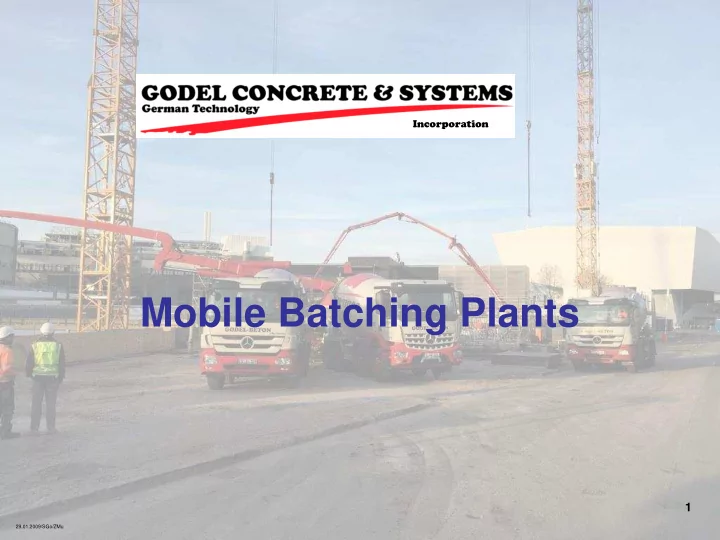

Incorporation Mobile Batching Plants 1 29.01.2009/SGo/ZMu
Content Page Erecting and Running of Mobile Plants - Pictures 3 -14 Specifications 15 -16 Settings 17 - 20 Pros and cons 21 - 23 2
Plant with Linear Hopper System 3
Plant with Linear Hopper System 4
Plant with Linear Hopper System 5
Plant with Linear Hopper System 6
Plant with Vertical Silos 7
Plant with Vertical Silos 8
Erecting a Mobile Concrete Plant 9
Erecting a Mobile Concrete Plant 10
Mobilization of Mobile Concrete mixing Plant 11
Mobilization of Mobile Concrete mixing Plant 12
Mobilization of Mobile Concrete mixing Plant 13
Mobilization of Mobile Concrete Plant 14
Specifications[1-2] MOBILE BATCHING PLANT Aggregate Supply: The aggregates are delivered to the material storage. Silos are feeded by wheel loaders over ramps into the provided hoppers Capacity (with extension) 175 m³ hoppers 5 (5 x 35 m³) Binder Storage: in 3 Silos je 3 x 60 m³ / 75 to Sorts max. 5 Dosage: Aggregates, binding materials, water and admixtures by calibrated scales Mixer: 1 BHS-Twin-shaft batch mixer 3000/2000 ltr. Performance per hour: with a mixing time 30s ca. 85 m³ / h Transfer height: for filling lorries (transit mixers / mixer trucks) 3,9 m Control system : Microprocessor, fully automatic control in self-contained service zone 15
Specifications [2-2] Electric service (on site): Supply voltage AC/rotary current 400 V Current frequency 50 Hz Rated Power Supply ca. 160 kVA Water Supply (on site): min. DN 80 30 m³ / h Water Pressure (on site): 4-6 bar Required Floor Space: Whole plant ca. 2.500 m² Thereof: Plant ca. 300 m² Ramps ca. 300 m² Storage ca. 1.000 m² Movement area ca. 500-1.000 m² 16
Settings [1-4] The plant is designed for producing fresh concrete and loading it in lorries. It consists of factory-assembled units which are erected on a sturdy subgrade. The aggregates are stored in a linear hopper system. Straight below the hopper system a weighing conveyor belt is located. The dosage happens by pneumatic activated closures; the aggregates are loaded on the conveyor belt. The conveyor belt discharges into an aggregate feeding hopper hanging in a support device. A sloped elevator with brake gear engine transports the aggregates, which were weighed for each single batch. . 3 or 4 binder silos are located in front of the plant. These binder silos are filled with silo trucks via specific filling pipes, through which the binder is blown. The silos are equipped with filters to ensure that the dust load of the air is less than 20 mg / cbm. Filling-level meter supervise continuosly the silo stock. To avoid overfilling there are additional probes with acustic signals and pneumatic triggered squeezing valves in the filling line. Screw conveyors transport the binding materials from the silos into scales above the mixer. A pneumatic triggered closure opens and gives the weighed binders into the Twin-shaft batch mixer. 17
Settings [2-4] The water scales is arranged above the mixer. Separate tanks storage the admixtures. A scales with several chambers doses the liquid admixtures straight into the mixer. All scales can be calibrated under German directives. The Twin-shaft batch mixer on the mixer platform works in batches with maximum batches of 2 cbm ready-mixed concrete. The maximum output is 85 cbm if a mixing time of 30 s is required. The mixer is provided with a dustproof coverage. Filter ventilate mixer and binder scales. The ready-mixed concrete is handed over via a funnel into the truck mixer‘s drum. A fully-automatic compressed plant secures the function of all pneumatic operating cylinders. The batch plant is equipped with a heater for air and water. Warm air heats the aggregates and warm water ist used when weather is cold to ensure necessary concrete temperatures. 18
Settings [3-4] It is also possible to install a chiller to produce cold water and air. A fully automatic system controls the mixer. The concrete mix designs are saved and can be selected by using the PC. The control system corrects parameters and handles parts of orders or additonal orders. A coloured pattern makes it easy for the operator to check all scales and supervise the whole process. It is possible to operate the functions manually if disturbances occur. Control units and electric installations fulfill high German standards. The units are accommodated in an air-conditioned room container. The position of this room container guarantees a very good overview. 19
Settings [4-4] Dust emission When filling the binder silos the outgoing air is cleaned with filters. The pollutions before filling is about 10 g/cbm, the outgoing are is polluted with max. 20 mg/cbm. When the binders leave the scales and are handed over into the mixer the system is capsuled against the leaving of dust. Noise emission Power units, moving material and vehicles cause noise. Disposal of waste concrete A reprocessing equipment recycles returned concrete and also the washing water and residual concrete from cleaning mixing plants, truck mixers and concrete pumps. The so won aggregates go returns to production. Waste water is storaged in bins with stirring units and also returns back to production. 20
General advantages and disadvantages when using a mobile batching plant 21
Benefits when operating a mobile batching plant The plant can be used for one single project and ensures an optimal supply. No traffic jams. Delivery just in time. Short transportation ways guarantee a consistent concrete quality Vehicle movements is cut in half. The average truck-volume for binders and aggregates is about 28 to whereas the truck mixers loads about 15 to. Better quality by optimizing concrete for reliable workability time. Very short mobilization and erection time. 10 days from delivery to production. 22
Disadvantages when operating a mobile batching plant Less utilization of concrete mixing plant because of limited quantities at the construcion site, may be compensated with supply to 3rd Party Additional areas necessary, and preliminary work 23
Thank you. 24
Recommend
More recommend